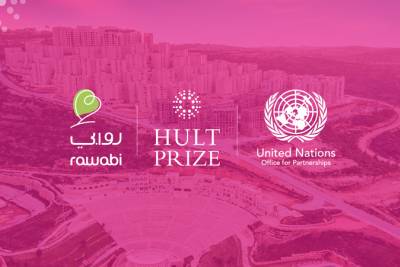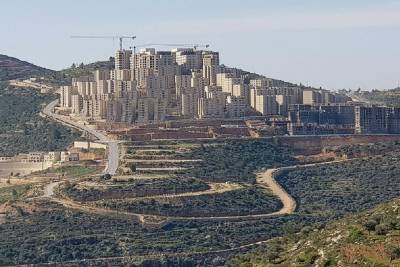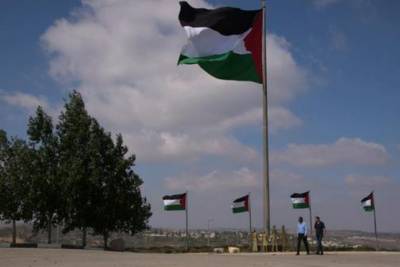Rawabi: A City on a Hill
Rawabi is the first Palestinian planned city, providing opportunities for affordable homeownership, employment, education, and leisure. A Greenfield project, the city’s state-of-the-art infrastructure was designed according to a masterplan that prioritizes urban planning and environmental sustainability. The city is being developed by Bayti Real Estate Investment Company, a joint venture of Massar International and the State of Qatar. Bayti is headed up by Palestinian entrepreneur and founder of Rawabi Bashar Masri. Situated in the geographic heart of the country, Rawabi is easily accessed from all existing major metro areas, including Jerusalem, Ramallah, and Nablus. The city’s municipal boundaries encompass 6,300,000 square meters of land. Within its 22 neighborhoods, the city contains more than 6,000 housing units for 25,000 residents. In the coming years, subsequent construction phases will bring the city’s population to 40,000. Investment in Rawabi will ultimately exceed $1.4 billion USD, making the city the largest private sector undertaking in modern Palestinian history. The city’s construction will create between 8,000 and 10,000 jobs. The city’s big-picture challenge is ambitious: expand Palestine’s residential infrastructure to address critical housing demands and build a modern commercial infrastructure to kickstart key sectors of the Palestinian national economy and position them for sustained growth. In a region where politics and economics are intrinsically entwined, Rawabi must achieve these goals in a volatile environment presenting unique challenges of its own. The city is realizing its vision with the creation of state-of-the-art infrastructure components new to Palestine and unique in the region. Building Rawabi from scratch has allowed the developer to integrate smarter, greener, and more sustainable practices at every stage of construction: reclamation and reuse of both water and building materials, placing utility and telecommunications networks underground, and the creation of a pedestrian-only city center.
Q Center
Rawabi’s downtown area, Q Center, is a modern mixed-use urban core designed to serve as a regional business hub. Set within a traditional pedestrian zone, Q Center offers high-end office and commercial space for local and international companies. Currently, over 100 international brands have opened stores within Q Center, alongside an entertainment arcade and a diverse offering of cafes and restaurants. Soon, the center will expand to include a five-star hotel, a convention center, a multiplex cinema, a gym, a spa, a cultural center, and a museum. There will also be an underground, easy-access hypermarket, combining grocery shopping with department store retail.
Rawabi Tech Hub
The city’s Tech Hub is designed to advance the Palestinian technology industry, a key growth area in a country anticipated becoming an outsourcing destination for multinational corporations in coming years. The Tech Hub will consist of: Outlets for local and international tech companies technology training institution entrepreneurial community space (CONNECT) An innovation fund and incubator (Bader)
WaDina
Spanning more than 135,000 square meters, WaDina is Rawabi’s answer to Palestine’s lack of leisure activities. The largest open-air public recreation area in the country, WaDina has made Rawabi a tourist destination for local and international visitors. Rawabi Extreme offers a wide range of sporting and entertainment activities, including the longest zip-line in the Middle East and a modern open-air amphitheater seating up to 15,000 spectators.
Housing
All housing units are priced within the financial reach of young professionals. Each unit offers underground parking and a choice of floor plans. The city also hosts a church, a mosque, playgrounds, and a medical center. Residents benefit from a comfortable living environment that features spacious sidewalks, outdoor exercise equipment, walking trails, and parks. We intend to build up to eight schools and 35,000 square meters of land have been set aside for this purpose. The Rawabi English Academy, the city’s first school, opened its doors to students in September 2016. Rawabi is currently home to more than 4,000 residents, with more families moving in every day.
Municipality
Rawabi’s municipal council is the first Palestinian council to govern a master-planned city. The council will undertake the same administrative and development tasks as Palestine’s other established municipal councils. It will also work in close coordination with Rawabi’s new Homeowner Associations (HOAs) representing city residents. The HOAs will be an essential component of life in the new city, allowing residents a say in community affairs.
Looking Ahead
As a Greenfield project in a region fraught with turmoil, Rawabi’s developers faced obstacles that would have discouraged many others. But as each challenge was met and won, as more families come to call their city home, its future becomes ever brighter.Featured photo © Rawabi FoundationFacebookTwittergoogle_plusLinkedIn
Jack Nassar
Executive & Operations Director, Rawabi Foundation
Since joining Massar International in 2009, Jack Nassar has served in a number of roles in which he has worked directly for Massar’s Chairman, Bashar Masri.
Jack is currently leading the Rawabi Foundation, a nonprofit institution founded alongside the city, to share and promote Rawabi’s ethos of entrepreneurship and innovation while actively supporting the heritage and development of Palestine; with a vision to create an invigorating new model for social, cultural and economic development, as well as tourism, which embraces urban planning, culture and education.
Jack has extensive experience in large-scale event planning in both the public and private sectors. This includes while working in the Prime Minister’s Office of Palestine between 2008 and 2009 and logistical management of the 2008 Palestine Business and Investment Forum in Washington.
Jack holds a B.A. in Business Administration from Birzeit University, Palestine, and MA in Political Communications from Goldsmiths, University of London.
To view original article, Click Here



